Staff-student partnerships help create radical engineering curriculum
Award-winning Integrated Engineering Programme (IEP) shaped by research, industry and, crucially, students

28 November 2017
In response to a serious skills gap reported by industry in 2012, UCL Engineering developed a radical vision for a new interdisciplinary education for undergraduates. Five years on, the Integrated Engineering Programme (IEP) is blazing a trail in engineering education, attracting interest worldwide and turning the traditional curriculum on its head.
Student engagement is the key to success
A key ingredient of the IEP’s success is the partnership with students, resulting in a constantly developing curriculum. The partnership approach aligns closely with UCL’s Education Strategy, which seeks to give students opportunities to shape policy and practice at local and institutional levels.
"Students on the IEP feedback on the course throughout their years of studying. We are able to give feedback quickly through questionnaires and also take part in focus groups to give our own honest detailed opinions of the curriculum. IEP Ambassadors and student representatives regularly communicate and work on educational and engagement projects directly with the staff leading the IEP. It is through this student input that the students here at UCL feel that they are a respected part of the team improving engineering education as part of the IEP."
Chris Wooster, student
A programme leading cultural change
Originally led by by Professor John Mitchel, now Vice-Dean (Education) in UCL Engineering, the IEP is currently leading cultural change across the faculty through the leadership of Emanuela Tilley, the current IEP Director.
Back in September 2013 a team of highly-experienced teaching fellows was assembled to drive the new programme towards enrolment of the first students in 2014/15. The team’s challenge? To create an education that would develop a new generation of engineering graduates – technically skilled, with dispositions, attitudes, and work-readiness skills to enable them to effectively transition into employment.
To make this happen, they introduced an industry-relevant, practical pedagogy that makes use of active learning techniques, such as problem-based learning, rich in real-world context and complexity, and exploring risk, environment, costs, timelines, and decision making. There’s a major emphasis on developing the skills needed to design innovative solutions and technologies, and transferable professional skills, such as communication and ethics, are taught using real world examples tailored to each subject. Assessment methods and coursework are created for wider audiences and aligned with what is expected of engineering graduates in the working world.
For example, learning Engineering Mathematics theory in isolation from practice offers students detailed understanding of the theory but can mean they lack the abilities to apply it. By integrating mathematical modelling and simulation with the engineering understanding, students are able to better understand the details of the analytical concepts as well as apply them confidently to unfamiliar situations.
Collaborating with teaching and research staff, students and industry
IEP teaching is designed, developed and delivered by working groups consisting of departmental staff, industry and other institutions. Research-active academics and fellows from all departments collaborate with the IEP team and post-graduate teaching assistants (PGTAs) to design and deliver core learning inspired by their research and current industry practice.
Crucially, teaching is designed and developed in partnership with students:
- Staff and students from across the faculty work together to revise content, assessment and delivery methods, with input from industry.
- IEP Student Ambassadors lead on creating engagement activities and mentoring schemes to help new students transition into higher education and the IEP.
- Undergraduate students collaborate with academics to make transformational pedagogical changes through student-initiated, UCL Changemaker and faculty-funded summer studentship projects: over 50 student projects have been funded to date.
- Senior undergraduate students participate as How to Change the World undergraduate teaching assistants, making considerable contributions to the student learning experience.
- PGTAs are integral to the IEP, involved in developing alternative teaching material to address a range of student learning styles, delivering learning and assessment, and coaching students.
"Students are central to the development and delivery of the IEP. I was delighted when an undergraduate teaching assistant told me after participating in How to Change the World that ‘she was often the first-person students would go to for help’. PGTAs are peers amongst the IEP teaching teams and during How to Change the World one said ‘I don’t think the students can tell the difference between the PGTAs and the cohort leads." Emanuela Tilley, IEP Director
Core studies enriched by projects
As in past years, prior to the introduction of IEP, students continue to register for a core discipline in one of the faculty’s eight undergraduate departments, Biochemical Engineering, Biomedical Engineering, Chemical Engineering, Civil Environmental and Geomatic Engineering, Computer Science, Electronic and Electrical Engineering, Mechanical Engineering and UCL School Of Management (via the Management Science programme). These departments continue to develop their own distinctive innovations in teaching.
But through the IEP students also meet, mix and work with specialists from other disciplines, within engineering and beyond. Features of the programme include:
- The Engineering Challenges: two 5-week global engineering projects, including one that is interdisciplinary based
- Scenarios: six discipline-based, intensive week-long projects during which students do not attend any other class
- How to Change the World: a two-week, interdisciplinary team-based design challenge, which is part of the UCL Global Citizenship programme and aimed at having students tackle socially based societal global problems.
The IEP team leads a wider teaching team of more than 200 staff across UCL Engineering. The team, who accepted the Higher Education Academy award, consists of Dr Emanuela Tilley (Director), Dr Abel Nyamapfene and Dr Kate Roach (Senior Teaching Fellows) and Professor John Mitchell (UCL Engineering Vice-Dean, Education, and Founding Director of the IEP).
 Close
Close

